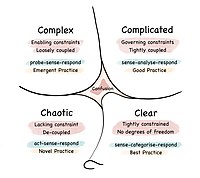
Photo from wikipedia
Abstract Objectives This study aimed to (1) examine barriers and enablers to General Practitioners’ (GP) use of National Institute for Health and Care Excellence (NICE) guidelines for self‐harm and (2)… Click to show full abstract
Abstract Objectives This study aimed to (1) examine barriers and enablers to General Practitioners’ (GP) use of National Institute for Health and Care Excellence (NICE) guidelines for self‐harm and (2) recommend potential intervention strategies to improve implementation of them in primary care. Design: Qualitative interview study. Methods Twenty‐one telephone interviews, semi‐structured around the capabilities, opportunities and motivations model of behaviour change (COM‐B), were conducted with GPs in the United Kingdom. The Theoretical Domains Framework was employed as an analytical framework. Using the Behaviour Change Wheel, Behaviour Change Techniques (BCTs), intervention functions and exemplar interventions were identified. Results GPs valued additional knowledge about self‐harm risk assessments (knowledge), and communication skills were considered to be fundamental to high‐pressure consultations (cognitive and interpersonal skills). GPs did not engage with the guidelines due to concerns that they would be a distraction from patient cues about risk during consultations (memory, attention and decision processes), and perceptions that following the guidance is difficult due to time pressures and lack of access to mental health referrals (environmental context and resources). Clinical uncertainty surrounding longer term care for people that self‐harm, particularly patients that are waiting for or cannot access a referral, drives GPs to rely on their professional judgement over the guidance (beliefs about capabilities). Conclusions Three key drivers related to information and skill needs, guideline engagement and clinical uncertainty need to be addressed to support GPs to be able to assess and manage self‐harm. Five intervention functions and ten BCT groups were identified as potential avenues for intervention design.
Journal Title: British Journal of Health Psychology
Year Published: 2022
Link to full text (if available)
Share on Social Media: Sign Up to like & get
recommendations!